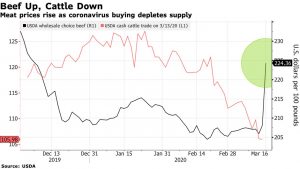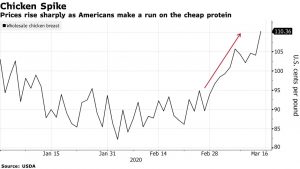Bloomberg's Mike Dorning reported on Wednesday that, "The Biden administration announced $12 billion in new farm aid, and said it will seek to expand Covid assistance to producers that weren’t…
During Outbreak, USDA Ensures Food Safety While Protecting Health of Inspectors
Reuters writer Tom Polansek reported this week that, “The U.S. Department of Agriculture is seeking to reassure meat producers it will keep slaughterhouses staffed with federal inspectors as fears about potential shutdowns due to the new coronavirus hammer livestock prices and fuel concerns about food supplies, meat industry groups said on Monday.
Livestock markets have been hit hard as the spread of the virus threatens workers that companies rely on to process and inspect meat.
“Prices for cattle and hogs could fall further if coronavirus cases force companies like Tyson Foods Inc or WH Group’s Smithfield Foods to close slaughterhouses. Shutdowns would remove markets for farmers to sell their animals and could temporarily tighten meat supplies.”
Mr. Polansek noted that, “The USDA said it would use its authority and ‘all administrative means and flexibilities to address staffing considerations‘ during the outbreak.
“Agency officials told the National Cattlemen’s Beef Association that the USDA will ensure it has replacement inspectors ready to staff slaughterhouses if necessary, said Colin Woodall, chief executive of the trade group. Farmers and industry groups said there were no confirmed shutdowns.”
Dear USDA Family,
— Sec. Sonny Perdue (@SecretarySonny) March 16, 2020
There comes a time in human events where certain folks are called to step up. As the Coronavirus continues to cause uncertainty, this is our time to step up. Thank you for proving that no matter the circumstance, we can truly "Do Right and Feed Everyone." pic.twitter.com/NJJ2DlZV6K
Also this week, DTN Ag Policy Editor Chris Clayton reported that, “While most of corporate America is practicing social distancing and working from home, the cattle industry and other food industries are focusing on keeping thousands of people at meatpacking plants continuing to produce food.
“Cattle prices have fallen, and at least one cattlemen’s group has called for direct aid to producers, but a critical element is ensuring food production continues. Late Monday afternoon, after weekend calls and concerns raised by livestock groups, USDA officials sent a statement to industry stakeholders on COVID-19, assuring that USDA is doing everything it can to continue inspecting food and keep packing plants operating.”
We're continuing to focus on service during the #COVID19 outbreak. @SecretarySonny reassures the American people that the U.S. supply chain remains strong. https://t.co/3vbVR0KXLu
— Dept. of Agriculture (@USDA) March 17, 2020
A news release from USDA on Tuesday stated that, “The [USDA] is ensuring the safety and timely delivery of the U.S. food supply while protecting the health of USDA employees during this COVID-19 National Emergency. Yesterday, USDA Under Secretary for Marketing and Regulatory Programs Greg Ibach and USDA Deputy Under Secretary for Food Safety Dr. Mindy Brashears sent a letter to stakeholders reassuring them that APHIS, AMS, and FSIS are rising to meet the challenges associated with COVID-19.”
Meanwhile, Bloomberg writers Lydia Mulvany, Isis Almeida, and Michael Hirtzer reported on Monday that, “Beef is red hot — for now.
“U.S. wholesale prices for the premium protein leaped the most since in over two years on Monday as coronavirus-fearing consumers cleaned out meat cases at grocery stores in bouts of frenzied buying. The effect may be temporary as restaurant closures begin eating into demand for steaks and other pricey items.”

“Wholesale buyers may also be stocking up because they’re concerned about virus-induced labor shortages at plants, which could lead to a sudden reduction in the amount of beef coming onto the market,” the Bloomberg writers said.
The Bloomberg article added that, “In the U.S. cash market, live cattle prices have dropped to the lowest for the season since 2010 at $1.0598 a pound. Supply chain disruptions could lead to prices testing recession-era lows of 80 cents a pound, according to Craig Turner, senior commodities broker with Daniels Trading in Chicago.”
During the Coronavirus National Emergency, @USDA_APHIS, @USDA_AMS & @USDAFoodSafety are ensuring the health & safety of our employees while still providing timely delivery of the services to maintain the movement of America’s food supply from farm to fork. https://t.co/LA3pBcfQ83 pic.twitter.com/2pyj9grMtO
— Sec. Sonny Perdue (@SecretarySonny) March 17, 2020
And Bloomberg writers Lydia Mulvany, Isis Almeida, and Edward Ludlow reported this week that, “Meat companies are ramping up processing to help restock coolers that are being emptied by Americans on edge because of the spreading coronavirus.
Tyson Foods Inc., the biggest U.S. meat processor, is making its ‘most-significant shift’ ever to produce more chicken, beef and pork that’s favored by supermarket shoppers, rather than cuts that restaurants use. Employees are working through weekends to fill as many orders as possible.
“Sanderson Farms Inc. said it is adding Saturday shifts at its five plants that process chicken for grocery-store customers, and is ready to convert two other plants to process more such birds. Pilgrim’s Pride Corp. and Perdue Farms Inc. are also working to accommodate the boom in retail demand.”

The Bloomberg article added that, “With the likelihood that school closures force some plant workers to stay at home, labor concerns are growing. The U.S. Department of Agriculture on Monday said plants will continue to operate staffed with federal inspectors.”





